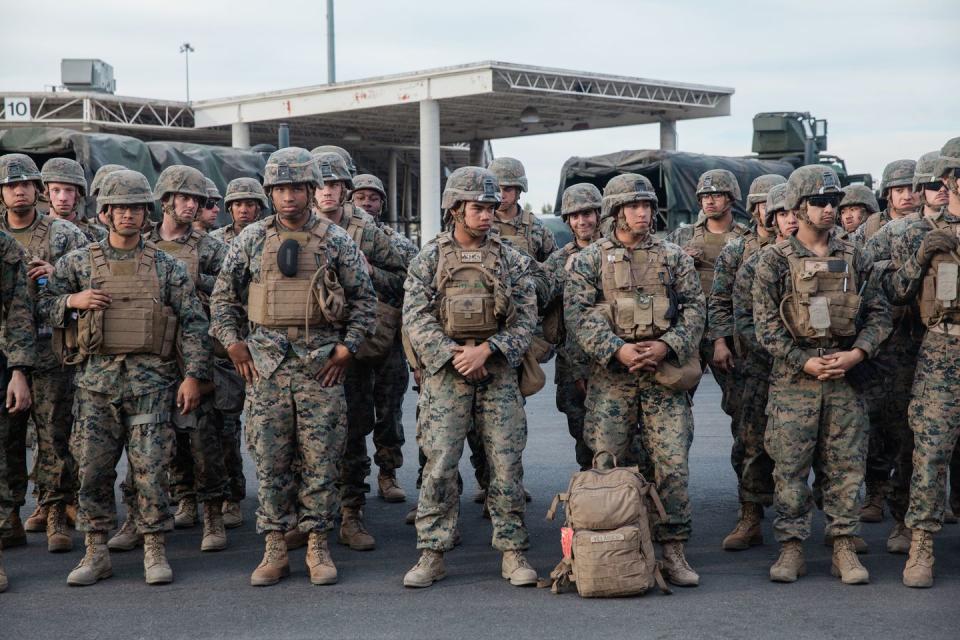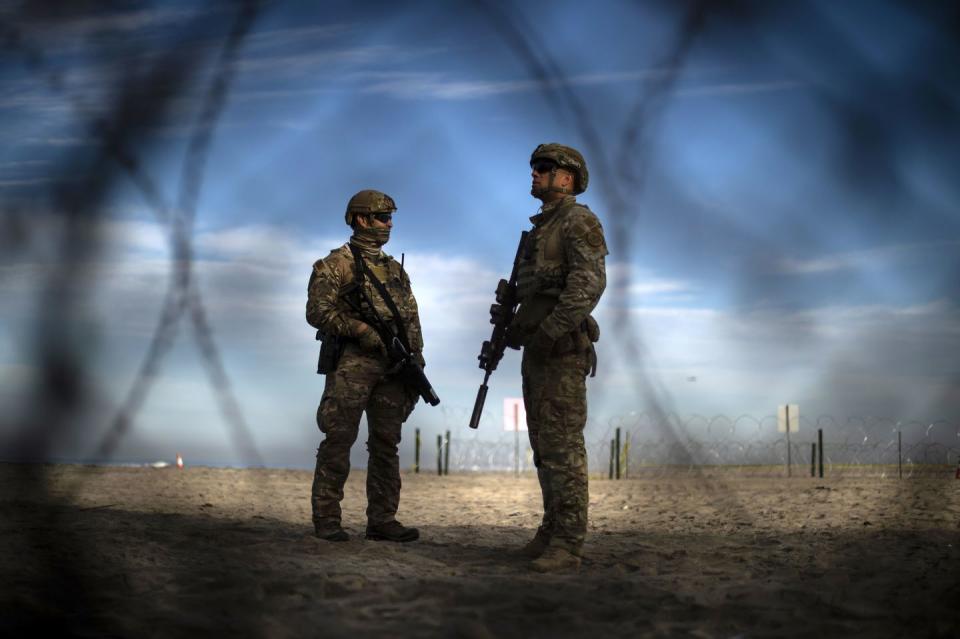Trump Doesn't Care That His Political Stunt Means Troops at the Border Will Miss Thanksgiving with Their Families

Nobody seemed too bothered when, in the homestretch of a campaign, the President of the United States used the military as a political tool to try to sway an election. Using the state's security apparatus like this is a hallmark of authoritarian regimes, and Trump did so on the basis of a largely trumped-up crisis, but all that took a backseat to the all-encompassing terror of The Caravan. Remember The Caravan? It was the hit sequel to The Ebola Panic (2014) and The Email Protocol (2016): a bad-faith Republican election stunt to monger the fear and get the old white people out to the polls, which cable news and the nation's biggest newspapers dutifully bit on as a major issue.
It was an obvious campaign ploy: the president-who executive-produced all three of the fine films above-tweeted 45 times about the border and at least nine times about The Caravan in the lead-up to Election Day. It was a staple of his rally speeches. In the time since, his mentions of the supposed "invasion" have dropped off precipitously, even as the group has gotten closer. Cable news has matched this disingenuous arc, maybe because there isn't nearly as much of a story when the president isn't yelling about it. There have been caravans before, and most in the current one are men, women, and children seeking asylum-as is their right under international law and treaties to which the U.S. is a signatory-on the basis they're fleeing chaos and violence in their home countries. In the Before Times, we might've called them refugees.

Meanwhile, the more than 5,000 troops Trump deployed were not actually authorized to engage the Caravaners: they were there to back up border patrol with "office support, transportation, and building up infrastructure." The president apparently plans to give them authority to "protect border personnel," though that hasn't yet happened. The drawdown will begin soon-not exactly a sign of an escalating crisis, even if there's been some unrest on the Mexican side of the border as migrants arrive in Tijuana. But what is absolutely clear is that more than 5,000 troops will be stationed in the southwest desert in spartan conditions-with no combat pay and little electricity-on Thanksgiving Day, pulled away from their families largely as part of a political stunt.
With the holiday fast approaching Tuesday, the president was asked about this. Here's his response:
JUST IN - President Trump, asked about the troops he sent to the border, who will be spending Thanksgiving away from their families: “Don’t worry about the Thanksgiving. These are tough people.” pic.twitter.com/GOxfL2nyu4
- Josh Campbell (@joshscampbell) November 20, 2018
He doesn't care. This is the first time he thought about it, and he wasn't even really thinking about it. Immediately he started speaking for them, with more than a little of the Many People Are Saying to it. "They are so proud to be representing our country on the border," he declared, and surely some are. But he doesn't know this from talking to them, because Trump has refused to go visit them. He sent Defense Secretary James Mattis instead.
In fact, in a break with all of his modern predecessors, he has refused to visit any troops in combat zones:
“Trump has spoken privately about his fears over risks to his own life...
‘He’s never been interested in going,’ the official said of Trump visiting troops in a combat zone... ‘He’s afraid of those situations. He’s afraid people want to kill him.’” https://t.co/ed4HGYqRRn- Dan Eggen (@DanEggenWPost) November 20, 2018
Faced with criticism over that, Trump declared Tuesday he would be visiting a combat zone. But he didn't specify which, and as we know, the president's word ain't exactly bond. This is the guy who banged on about how bad the Department of Veterans Affairs was during the campaign-and then handed over shadow management of the agency to three guys at Mar-a-Lago, none of whom served in the military or government and only one of whom has any kind of medical background. Trump refused to visit a 100-year World War I memorial in Paris due to rain this month-then screamed at his aides for not telling him it'd be a bad look when the other western leaders went without him.
He even attacked U.S. Admiral Bill McRaven-a decorated special ops commander who led the raid that killed Osama bin Laden, and who is battling leukemia-this week after McRaven dared criticize him. Trump slammed McRaven for not getting the Qaeda leader sooner, one from his Macho Archive that also includes how he would have run in and engaged the Parkland mass shooter. Pay no attention to the fact he's also afraid to visit troops in war zones. The attacks on McRaven are the latest in a long line of Trumpian vitriol aimed at combat veterans and their families, including a Gold Star family, but most infamously John McCain. Trump sneered at McCain for getting captured in Vietnam-a conflict Trump avoided by securing five draft deferments. He later referred to his quest to avoid sexually transmitted diseases in 1970s New York as his "personal Vietnam."

The president's concern for veterans and their families is contingent on whether they praise or criticize him. And he doesn't care about the people he sent to the border because, by and large, he doesn't care about anyone who doesn't share his last name. Over the coming weeks, one suspects even that will be tested. He doesn't care that they're away from their families for Thanksgiving, sitting in the desert so he could make a big, strong political statement. He doesn't care that he's steadily dragging the United States republic towards authoritarianism, deploying the military on U.S. soil for partisan politics. He only cares about getting through another day by the seat of his pants, lying through his teeth and snarling at anyone who points out how manifestly unfit for the job he is.
Support for this president is sinking among active-duty troops, but they cannot, by policy, make their voices heard. It is critical for those familiar with their experiences, like Admiral McRaven, to use theirs. We've concerned ourselves here with the thousands of troops who will spend Thanksgiving at the border, but there are thousands more who will spend it in the far reaches of Iraq and Syria and Afghanistan. In the latter case, this is the 17th consecutive Thanksgiving that American service members will be there.
The reasons why they're still there aren't much better-defined anymore than those we've heard for sending troops to our southern border. We ought to be thankful for the one percent of Americans who fight these fights for all of us, and spend all-American holidays away from home-even if we can't explain to them why they're there, or why every president before this one has always had American troops in some combat zone to visit.
('You Might Also Like',)

 Yahoo News
Yahoo News 
